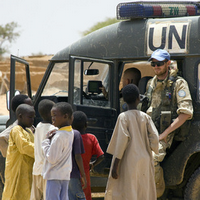A subtle evolution of United Nations peacekeeping operations is underway. If the first of these missions kept an agreed-upon peace, and later missions sought to make peace, several countries now use these operations to advance their foreign and economic policy agendas, and raise their global profile. This shift, selective as it is to date, may potentially raise the standard of conduct in U.N. peacekeeping operations increasingly fraught with charges of criminal behavior, corruption, lack of accountability, and general ineffectiveness. However, there are significant downsides to this approach.
The global movement of people, information, goods, and services creates new opportunities, but also new threats for peacekeepers. With the immediate and persistent availability of information, peacekeepers and their home countries will be increasingly held accountable for their actions, as well as their failure to act -- a situation countries were long able to avoid.
These same conditions create opportunities to increase the reach and the potential impact of peacekeeping, even in areas where the communications infrastructure is underdeveloped. As the geographic reach of a peacekeeping mission extends further beyond its immediate area of operations, the effects of success, or failure, increasingly shape perceptions of the contributing nation and the mission.

